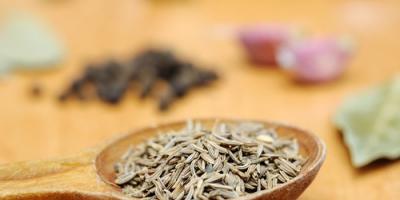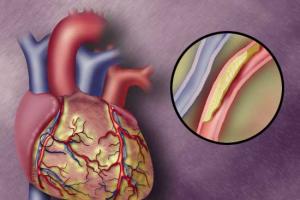Finding once again an empty pot, worried parents are sounding the alarm. Breasts are of particular concern. After all, constipation in a baby is a complex problem. Older children often, due to modesty and embarrassment, keep silent about the problem, teenagers try to solve the problem on their own. As a result, a delicate issue acquires complex consequences.
The hidden dangers of constipation
Both chronic and episodic problems with emptying lead to serious disturbances in the functioning of the gastrointestinal tract, pain, and comorbidities.
Together with feces, harmful toxic products leave the body. If the baby cannot go to the toilet for a long time, the reverse process occurs. Pathogenic substances are absorbed through the walls of the intestine into the blood. The body, saturated with toxins, reacts with vomiting, nausea, hyperthermia. Decay products cause inflammatory processes, relapses of other chronic diseases, sepsis are possible. Moving through the delicate children's intestines, feces, devoid of fluid, injure the walls. This can cause acute pain, up to loss of consciousness. The digestive and immune systems work in tandem. With constipation, the microflora is disturbed, causing problems with the body's defenses. In addition, difficult emptying adversely affects the absorption of vitamins and minerals. Straining during bowel movements provokes anal fissures in a child. Advanced cases cause hemorrhoids.
The younger the child, the more dangerous for him intoxication of the body.
Constipation in a baby
The newborn reacts to hunger, colic, the need for attention, pain with a cry, so constipation in an infant is not always easy to diagnose.
How many times should a baby go to the toilet?
In the first months of life, the baby is emptied after each feeding. Sometimes the absence of feces for two to three days is a normal physiological state. A month-old baby does not go to the toilet for several days, because undigested residues have not yet formed, have not accumulated. It happens that the mother's milk is ideal for the child and is completely absorbed. In such cases, defecation is less frequent, but without complications. The child is calm, active, normally gaining weight.
When should voiding problems be diagnosed?
the child cannot go to the toilet; the baby began to go to the toilet less often; the consistency of excrement has changed; defecation became difficult; the child pushes and blushes when trying to poop, cries from touching the tummy.
Causes of constipation in a baby
Non-compliance with the diet of a nursing mother. Eating too fatty foods, milk, fried foods, insufficient fluid intake. Breast milk deficiency. To exclude this cause, weight gain should be monitored. Lactose intolerance. It is diagnosed by a doctor, enzyme therapy is prescribed for natural feeding, for artificial feeding - replacement of the mixture. Lack of water. Often, formula-fed babies experience fluid imbalances. It is necessary to give the child clean water between feedings. Feeding introduction. The digestive system of the crumbs, when assimilating a new product, may react with constipation. Watch your baby's reaction. Respiratory diseases. An increase in temperature, changes in metabolism, taking medications can provoke constipation. For the prevention of constipation and a speedy recovery, it is necessary to water the child excessively. This is especially important for artificial feeding.
In rare cases, a baby is diagnosed with organic constipation caused by anatomical changes in the intestine (polyps, tumors, intestinal elongation, anus infection). These conditions are dangerous and require medical attention.
What stool is considered normal in a baby?
Soft, porridge-like stools are considered the norm for a child of the first year of life. Defecation is carried out easily, without crying and excessive redness, gases leave without tension. Massage of the abdomen does not cause pain in the crumbs.
How to help a baby with constipation?
Before proceeding with the treatment of the problem, it is necessary to establish the nature of constipation. If surgical pathologies are excluded, then an adult can provide therapy.
What to do when a child cannot go to the toilet:
massage. Gently stroke the baby's tummy clockwise with your palm or fist; thermal impact. Place the baby in a warm bath or apply a heated diaper to the stomach; position on the stomach. Lay the baby on your stomach. Try in this position to press the legs to the abdominal cavity; mechanical stimulation. In the supine position, alternately press the baby's legs to the stomach; enema. Prepare a 20-30 ml syringe for the child. Fill it with cool water or chamomile infusion. Pre-lubricate the anus with baby cream or petroleum jelly. The tip should be inserted carefully so as not to damage the delicate intestines of the baby; glycerin suppository. Place a candle in the anus, the active substance will soften the feces and the emptying will be gentle.
If the baby cannot go to the toilet after the manipulations, consult a doctor.
Constipation in older children
About a quarter of children of preschool and school age suffer from constipation. New, psychological reasons are added to the anatomical reasons, so it is important to find an approach to the child when identifying a problem.
Why do older children get constipated?
Nutritional imbalance. Children are known opponents of vegetables and cereals. Lack of fiber and fluid makes the stool hard. Sedentary lifestyle. Modern schoolchildren, as if nailed to the tablet, computer and TV. Reduced activity, stagnation in the pelvic organs, sitting position provoke constipation. Violation of the intestinal microflora. Illness, medications cause an imbalance of bacteria, which interferes with normal digestion. Fear of defecation. If the stool has already caused pain, then there may be a fear before going to the toilet. Psychological barrier. The child may avoid going to the toilet in kindergarten and school due to stiffness, the presence of other children. The longer the urge is held back, the more difficult the emptying. Stress, nervousness. Problems in the family, moving, problems with peers cause nervous tension. This entails spasm of the liver, stomach and intestines, and, as a result, constipation. Hormonal changes. It is especially important to monitor the stool in adolescence, the work of organs and systems is directly related to the hormonal background.
How to recognize constipation in a child?
If it is easy to recognize constipation in a baby due to parental control of visiting the restroom, then it is more difficult to diagnose a dangerous condition in an older child.
Signs of the disease
stool for constipation less than 3 times a week. Normal for a child is a chair from 3 times a day to 3 times a week; hard stools that make it difficult to pass a small amount of feces; rash on forehead and temples; nausea, loss of appetite; change in the smell of urine; anxiety and restlessness of the child.
Treatment of constipation in children
To determine the cause of the stool disorder, it is necessary to pass an analysis of urine, feces and blood, conduct an ultrasound examination of the abdominal cavity, an x-ray of the intestine, and, if necessary, perform an endoscopic examination of the gastrointestinal tract.
The primary diagnosis of the disease is carried out by a therapist or pediatrician. Corrects the patient's diet, prescribes drug therapy.
A gastroenterologist deals with special treatment of constipation, he conducts a narrow diagnosis of the problem, selects a treatment, and refers to related specialists.
Medical assistance
What to do if constipation does not go away? To eliminate the problem, laxatives based on lactulose are used (Duphalac, Bisacodyl, Softovak, Defenorm). The principle of action is the optimization of microflora, softening of feces. It is also recommended to take antispasmodics ("Papaverine", "No-Shpa", "Buscopan", "Duspatalin").
Folk remedies
If the child does not go to the toilet for a long time, you can use folk remedies:
intake of vegetable oils before meals (sunflower, olive); the use of a decoction of hay grass and raisins (a quarter cup before meals); the use of aloe juice (2 teaspoons before meals); taking on an empty stomach a crushed mixture of dried apricots, prunes, raisins, honey (2 tablespoons); drinking infusion of dill (1 tablespoon of dill per 1 cup of boiling water)
Power correction
In the menu of a child suffering from constipation, foods rich in fiber must be included. It is recommended to include in the diet:
fresh and boiled vegetables, vegetable juices (beets, carrots, cabbage of all kinds, pumpkin, zucchini and others); fruit juices with pulp, fruits (pear, apple, apricot, plum and others); vegetable soups; cereals (mainly oatmeal, buckwheat, barley); fresh dairy products; dried fruit compotes; bran and rye bread, bran.
All astringent foods should be excluded: rice, semolina, jelly, muffins, chocolate, drinks containing caffeine.
Be sure to drink enough liquid. For a child 3 years old - 1 liter of water.
How to eat?
It is necessary to eat fractionally, distribute the daily dose of food into 5-6 meals. Half a glass of warm liquid can be drunk half an hour before meals. Food should be boiled, baked or steamed. It is important to chew your food well.
Massage
In order for the child to go to the toilet, massage can be used as an aid. It should be started no earlier than 2 hours after eating. First, work out the navel area, then proceed to massage the right and left sides. Be careful around the appendix.
The last part to be massaged is the area above the pubic bone. Pay attention to the close location of the genitals in this place. During manipulation, only light pressure in a clockwise direction is allowed.
Before the massage, the child must be examined by a doctor!
Prevention of constipation
To avoid the return of unpleasant symptoms, simple rules will help, including:
balanced diet; adequate fluid intake; sleep and rest regimen; active lifestyle; protection from stress.
Remember, your attention and affection, together with the implementation of the recommendations of doctors, is the best remedy for the disease.
Do not hesitate to seek help from specialists in order to preserve the precious health of your baby.
Do you still think that curing the stomach and intestines is difficult?
Judging by the fact that you are now reading these lines, victory in the fight against diseases of the gastrointestinal tract is not on your side yet ...
Have you thought about surgery yet? It is understandable, because the stomach is a very important organ, and its proper functioning is the key to health and well-being. Frequent pains in the abdomen, heartburn, bloating, belching, nausea, impaired stool... All these symptoms are familiar to you firsthand.
But perhaps it is more correct to treat not the consequence, but the cause? Here is the story of Galina Savina, about how she got rid of all these unpleasant symptoms... Read the article >>>
A newborn man has a perfect body, however, his functional features are not fully developed. This includes a weak digestive system, which fails at the most unexpected moments. We will talk about what to do if the child cannot go to the toilet for the most part: is it worth panicking and calling the doctors, or can you deal with the problem yourself.
Normal bowel movements in newborns and older toddlers
Defecation in children of different ages occurs in different ways: you should not equate a 2-month-old and a 2-year-old child in terms of the quantity and quality of feces. The normality of bowel movements and their frequency depends on the development and strengthening of the digestive system. Below we will consider normal performance for children of different ages:
Infants up to 5 months
Newborn babies have a weak digestive system that constantly empties the stomach. If nature had not provided for this moment, the child would often suffer from pain and colic. An infant under 5 months produces several acts of defecation per day: as a rule, they are equal to the number of feedings. If a child is fed on artificial nutrition, the number of bowel movements is reduced to 1-2 times a day, which is also considered a normal indicator. Infants from 5 months
Five-month-old artificial workers do not change the regime: they also go to the toilet for the most part once or twice. But children who eat mother's milk, reduce the number of bowel movements by half. In this case, the feces take on a formalized appearance. Children after 2 years
After two years, the fecal masses of children acquire their final shape and occur with a frequency of once a day. Observe the features of the stool: spherical discharge signals problems with the intestines and requires an appointment with a pediatrician.
Organic and functional causes of irregular bowel movements
 The causes of complicated and irregular bowel movements are divided into organic and functional. Functional causes are the easiest to influence: they are, in fact, factors of unbalanced nutrition that are easily eliminated. Organic causes lie in violations of the digestive system. Consider each type of violation in more detail.
The causes of complicated and irregular bowel movements are divided into organic and functional. Functional causes are the easiest to influence: they are, in fact, factors of unbalanced nutrition that are easily eliminated. Organic causes lie in violations of the digestive system. Consider each type of violation in more detail.
Functional disorders
As mentioned above, functional impairment in 80% of cases determined by the nutritional factor:
Abrupt change in diet: replacement with formulas and cereals from other manufacturers or inappropriate age range of components of the mixture Improper nutrition of the mother who is breastfeeding Low amount of liquid in the diet Replacement of vegetable and milk formulas with mixtures containing high amounts of protein Fatty foods uncharacteristic for the age of the infant Deficiency of plant-based products.
Eliminating these factors, you will correct the functional work of the baby's intestines and forget about problematic bowel movements.
Organic disorders
Organic disorders are an unpleasant event for every mother. The development of painful pathologies is acutely reflected in the baby, the use of drugs undermines the overall immunity. Consider what leads to problematic bowel movements based on one of the causes of an organic disorder:
Change in the hormonal level of the baby Calcium deficiency: it entails rickets, and as a result, a violation of the proper functioning of the digestive system Anemia (including iron deficiency) Food allergy Violation of the normal functioning of the central nervous system.
You can understand that the baby is overtaken by the impossibility of performing an act of defecation by the facial expression and tense posture: the tummy swells, the baby reacts painfully to touch. Children who can speak report abdominal discomfort on their own.
Symptoms of the impossibility of defecation
 The feces of the little man are monitored very carefully by mothers, and already on the second or third day after the delay in defecation, they begin to sound the alarm on the forums and in the doctor's office. But what about the kids, whose age has exceeded 3-4 years, and who go to the toilet on their own? Some are silent about such a delicate problem as the absence of a chair for a long time: parents, confident that everything is in order, can do not mention it for intestinal problems in a grown child. It is important to ask the baby every day whether everything is in order with the tummy, whether he went to the toilet for the most part. If the baby does not go to the toilet for more than 3-4 days, it's time to take care of his health and pay attention for the following symptoms:
The feces of the little man are monitored very carefully by mothers, and already on the second or third day after the delay in defecation, they begin to sound the alarm on the forums and in the doctor's office. But what about the kids, whose age has exceeded 3-4 years, and who go to the toilet on their own? Some are silent about such a delicate problem as the absence of a chair for a long time: parents, confident that everything is in order, can do not mention it for intestinal problems in a grown child. It is important to ask the baby every day whether everything is in order with the tummy, whether he went to the toilet for the most part. If the baby does not go to the toilet for more than 3-4 days, it's time to take care of his health and pay attention for the following symptoms:
The child has no appetite: he reacts sluggishly to his favorite treats The baby often wakes up at night, sometimes does not fall asleep at all The child is sick The child quickly loses interest in toys and gets tired of walking The baby complains of a bad taste in his mouth.
If you notice the presence of at least one symptom, see a doctor immediately.
It is important to follow formality baby's feces: Diarrhea causes irritation of the intestinal walls, the child experiences discomfort and a feeling of itching. Too hard feces, formed in the form of balls, leads to rupture of the anus. The fecal masses that have been retained for a long time in the intestine poison the body: toxins are absorbed into the walls of the intestine and are carried throughout the body. In this case, the child looks pale, tired.
How to help a baby
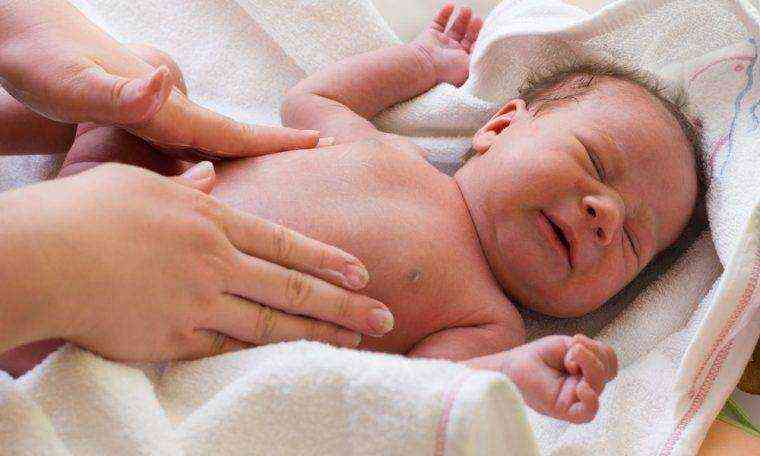 If you notice these symptoms, see your doctor: do not self-medicate after all, you cannot say exactly what type of violation is manifested in the case of your child.
If you notice these symptoms, see your doctor: do not self-medicate after all, you cannot say exactly what type of violation is manifested in the case of your child.
If the doctor found functional impairment, correct the frequency and quality of bowel movements is proposed by changing the diet. Water therapy is prescribed, according to which the child should consume the maximum possible amount of clean water per day for his age. Increased consumption of fresh fruits and vegetables is prescribed.
Attention: juices, tea, compote - do not correct the water balance, but are only an additional element of the intake of certain beneficial substances into the body.
Dufolac, Laktusan, Hilak Forte are used as medicines in the treatment of constipation. It is not recommended to prescribe drugs on their own: consult your doctor before use.
Exercise to relieve pain
 To alleviate the torment of a newborn or an older baby, it is recommended to use the following type of gymnastics:
To alleviate the torment of a newborn or an older baby, it is recommended to use the following type of gymnastics:
For babies
Turn the child on the tummy, let lie down in this position for at least 10 minutes. Conduct before each feeding. The bicycle exercise also helps. Move your baby's legs for 5-77 minutes for better bowel function. For children 2-3 years old
Adult kids are invited to treat themselves on their own: the child should lie down and put his hands on his stomach. Ask the baby to make circular strokes: 10 times in one direction, 10 times in the other. You need to finish the gymnastics with the exercise "bike".
Do not worry if the baby has not gone to the toilet for two or three days: as a rule, this indicates that the intestines have processed the food well and no stool has accumulated to exit. However, notice the reaction and sensations of the baby during this period - if they correspond to those described, call the doctor and ask for further advice. Health to you and your baby!
The period when the baby does not go to the toilet in a big way cannot be ignored.
Symptoms of the disease; Solution to the problem;
Massage to help babies; Folk remedies when the baby cannot go big;
Therapeutic exercises for difficult emptying of the baby; Proper nutrition for breastfeeding mothers.
Almost every mother faces this problem.
Parents it is necessary to understand the signs of the disease and be able to help overcome it.
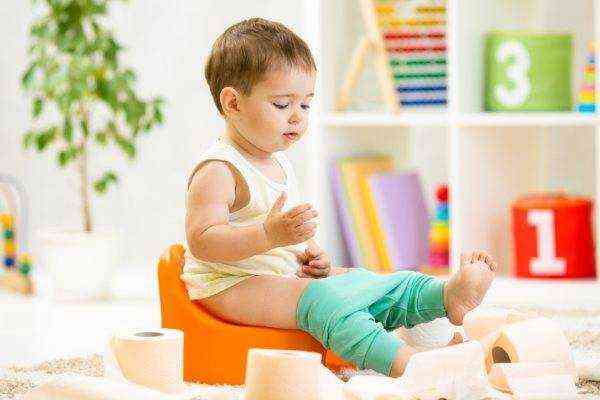
Almost every mother faces the problem of constipation.
Symptoms of the disease
From the very first days, the baby may experience constipation. Normal stool for babies is considered bowel emptying after each intake of breast milk. But there are children who go big 1-3 times in 24 hours.
If the child has satisfactory behavior, the tummy is not swollen, and the feces are soft and not dry, this is considered the norm.
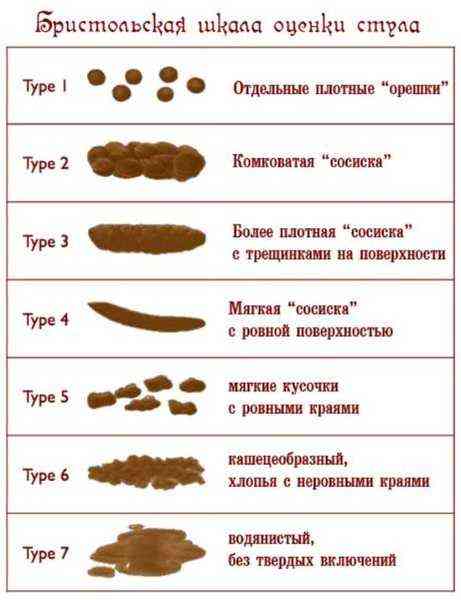
Some varieties of feces warn in advance of an impending illness.
It is important for mothers, especially primiparas, to know the symptoms of constipation:
1. Bloating, hardness in the abdomen.
2. No desire to eat.
3. Twitching of the lower limbs.
4. The child is tense, the face turns red, there is crying when pooping.
5. I suffer from colic in the tummy.
6. Baby not going to the toilet for more than one day.
Solution
Often, mothers themselves try to solve the problem of a baby who finds it difficult to go to the toilet in a big way. The best option is still to visit a pediatrician or call a doctor at home. It will not be difficult for him to determine the cause of constipation. After talking with the mother, examining the crumbs, the doctor will give an appointment.

The best option is still to visit a pediatrician, it will not be difficult for him to determine the cause of constipation.
Medicine has identified several traditional methods.
Massage to help babies
It is important for moms and dads to know the technique of massage. There are no difficult steps in the procedure, so one visit by a pediatrician is enough. Massage of the abdomen is done 3 times a day. The timing of it is very important. The procedure should be carried out when the child is in a good mood. It is forbidden to do immediately after breast sucking. Mom's nails should be well cut.
Having washed their hands in advance, the parent needs to lubricate their hands with baby cream or oil. The surface for massage is chosen on a solid basis, in order to avoid deflection of the vertebrae. With poor bowel movements, massage facilitates the movement of feces to the exit. Spend it for 10 minutes.

The procedure should be carried out when the child is in a good mood.
The procedure begins with gentle stroking of the abdomen. Called otherwise, it is preparatory stage. It is important that the baby is relaxed. Only the palms are involved in stroking. Movements are clockwise. The next are the ramifications from the navel up. This time, the palms should make the movement a little stronger than before.
After that, using the edge of the palm, do the following movement: starting from the right lower abdomen, draw a line up to the navel and 2 cm above it, then, increasing the movement, go down to the left side. Explaining in simple terms, the letter P is obtained. The final movement is carried out along the same line, only in a circle with the fingertips.
The next step is to lay the baby on the tummy. As a rule, children like this pose. At this stage, the mother should gently stretch the area of the shoulder blades to the line of the hips with a gentle movement. It's time for a useful exercise: with the help of mom, the baby makes a “bike”, and in conclusion, it is desirable that the baby crawl.
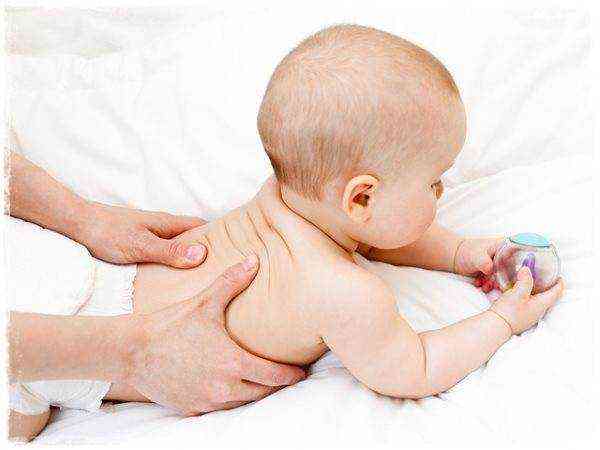
The next step is to lay the baby on the tummy.
Thus, having finished the therapeutic massage, the baby goes to the toilet in a big way, which means the child's condition will improve.
Folk remedies when the baby cannot go big
Having decided to resort to solving problems with the help of folk remedies, parents should consult a pediatrician: you never know what will be the reaction of the child to a particular remedy.
Many mothers use the old way with baby soap. A small piece is taken, rolled with hands under the shape of a candle and sent to the anus. Then, in a circular motion, the parent makes gentle strokes on the tummy. This method will well provoke the release. Often this method cannot be carried out, since soap irritates the intestinal mucosa.

Drinking dill water is one of the common ways to solve the problem if the baby does not go to the toilet in a big way.
grandma's recipe drinking dill water, one of the common ways to solve the problem if the baby does not go to the toilet in a big way. Using this method, it is necessary to adhere to the dosage: in the first month from birth, 1 teaspoon is given after feeding and before it, at 2-3 months - 2 teaspoons, at 4-5 months - 2 tablespoons, after 6 months - half a glass (100 grams).
It is not easy to know the dosage, but also correct cooking:
Are taken dill seeds in the amount of one teaspoon and pour a glass of boiled water. Three-month-old babies can take 2 teaspoons.
- boil 3 minutes;
- let it brew 15-20 minutes under the cover;
- strain after complete cooling through cheesecloth.
Seeds can be replaced with dill sprigs: two or three pieces per glass of boiling water.
Therapeutic exercises for difficult emptying of the baby
Can apply safe method for the baby - therapeutic exercises.
Children love her very much. The exercises are simple but effective:
1. Touching the knees, mom straightens her legs well and bends them carefully, bringing them to her tummy. Repeat the exercise 3 to 5 times.
2. Bicycle movement. One leg is pulled up to the stomach, the second is straightened, and vice versa. Do in the amount of 5-8 times.
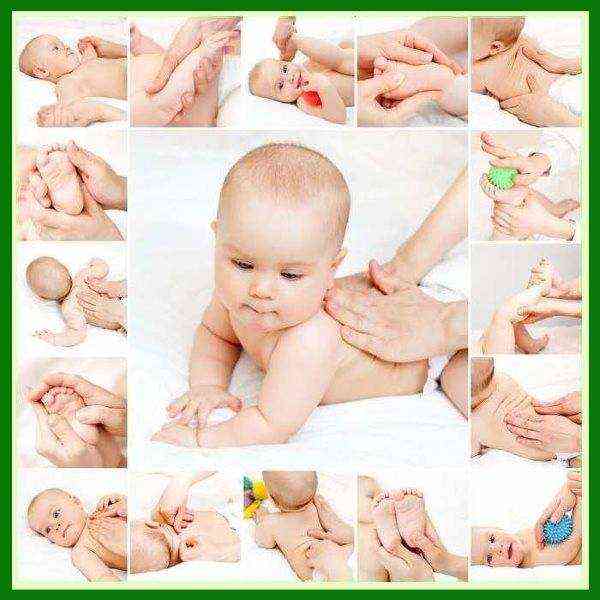
A safe method for the baby is therapeutic exercises.
3. Pull the bent left arm and right leg towards each other, then make the opposite movement: right hand to left leg, so 6-8 times.
4. The final exercise is the stand. Mom keeps her knees and raises her legs.
After that, it lowers slowly, without bending the legs, to the surface. The number of exercises is 5 times.
Proper nutrition for breastfeeding mothers
There is also mother's fault that the baby does not go to the toilet in a big way. A nursing mother is obliged to monitor the diet during breastfeeding. If it so happened that the child finds it difficult to empty, then the mother should review her menu. Might have been eaten prohibited products.
About spices, seasonings, hot peppers, fried foods, flour products, mom needs to forget for a while. Products should be used only in boiled, stewed form. Meals should be frequent, but in small portions. Sufficient fluid intake is also important. A good result is the use of boiled dried apricots, prunes. It is advisable to eat a few pieces before feeding and drink water.
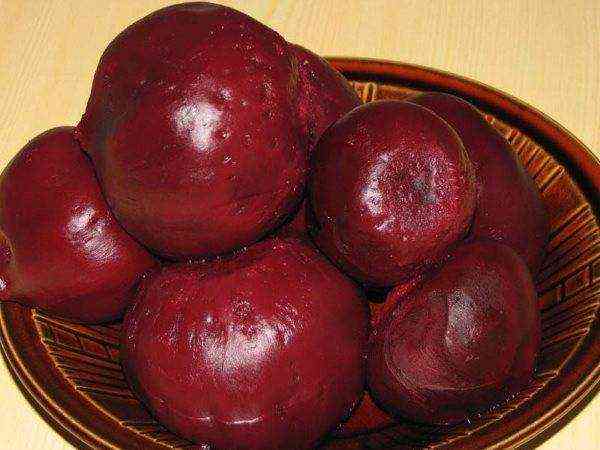
Grandma's way - boiled beets. Boiled in the usual way, peeled.
Grandma's way - boiled beets. Boiled in the usual way, peeled. Useful in this case beetroot, beetroot salad, mashed potatoes. You can use beetroot broth: cut the peeled beetroot into cubes, place in boiling water, cook until cooked. Use the drink 3 times a day.
Kefir is consumed warm, preferably at night. It is better to drink fermented milk products not quite fresh: let them stand for 1 day in the refrigerator. Pumpkin and apples combine not only irreplaceable taste qualities, but also vitamins, which are so important for a nursing mother. Recommended for daily use.
Avoid juices and carbonated drinks. Better to drink plain water. It is recommended to drink at least one liter per day. Should be taken as a rule eat first meals daily. They shouldn't be greasy.
You need to drink plain water. It is recommended to drink at least one liter per day.
If the baby still cannot go to the toilet in a big way after measures have been taken, A visit to the pediatrician cannot be postponed until tomorrow. Sweating, fever, obvious irritability of the baby are alarming signals.
Many mothers are faced with the problem of stool retention in infants, but timely treatment will prevent the occurrence of diseases of the digestive system.
Find out now about the most useful preparation Plantex for newborns (instructions for use). From colic, constipation, bloating, regurgitation and to normalize digestion.


